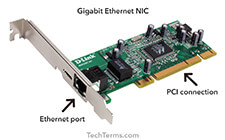NIC
Stands for "Network Interface Card" and is pronounced "nick." A NIC is a component that provides networking capabilities for a computer. It may enable a wired connection (such as Ethernet) or a wireless connection (such as Wi-Fi) to a local area network.
NICs were commonly included in desktop computers in the 1990s and early 2000s. In the 1980s and early 1990s, many computers did not include networking capabilities, so a NIC could be added as an expansion card. Most NICs were installed in a PCI slot on the motherboard. Early NICs included a BNC connector for coax network connections, though Ethernet ports soon became the standard. Therefore most NICs include one or more Ethernet ports.
As wireless networking became more popular, wireless NICs also grew in popularity. Instead of an Ethernet port, wireless NICs are designed for Wi-Fi connections and often have an antenna to provide better wireless reception for the computer. Older wireless cards have PCI connections while most modern wireless NICs connect to a PCI Express slot.
Since many different networking standards exist, it is best to match the specifications of a NIC to the standard of the network. For example, if you are connecting to a Gigabit Ethernet network, a Gigabit Ethernet NIC is the best choice. A 100Base-T card will work, but you will only get 1/10 of the possible data transfer rate. A 10 Gigabit Ethernet Card may also work, but you will only experience gigabit speeds on the network. Wireless cards also use the lowest common denominator between the network and the NIC. However, if a wireless card does not support a newer wireless standard (such as 802.11ac), it may not be able to connect to the network.
NIC vs Network Adapter
Technically, a NIC is a physical card that connects to an expansion slot in a computer. Many computers and wireless devices now include an integrated networking component called a network adapter. This may be an Ethernet controller and port attached to the edge of a motherboard or a small wireless networking chip located on the motherboard. A network adapter may also be a small peripheral that connects to a USB port. While the terms "NIC" and "network adapter" are often used synonymously, a NIC is a type of network adapter while a network adapter is not necessarily a NIC.
 Test Your Knowledge
Test Your Knowledge